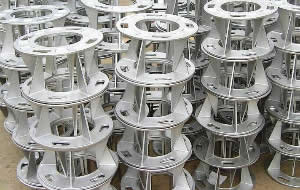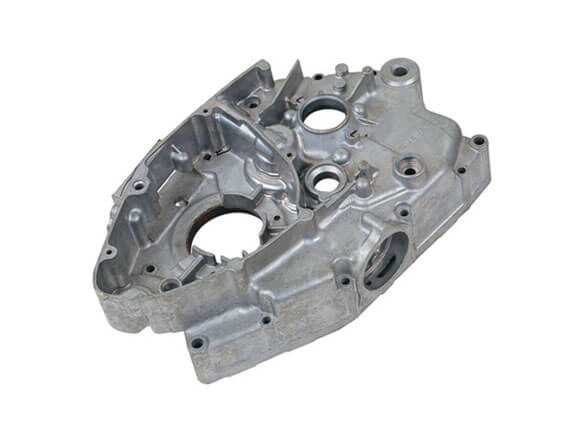Why Precision aluminum casting is perfect for lightweight metal solutions
Wiki Article
The Role of Aluminum Foundries in Advancing Lightweight Production Solutions
Light weight aluminum foundries considerably add to the development of light-weight production remedies. Their cutting-edge casting technologies generate high-strength, light-weight elements vital for industries such as automobile and aerospace. This innovation not just boosts product efficiency but likewise promotes sustainability via making use of recycled products. As these factories adapt to emerging methods and technologies, they lead the means for future advancements in manufacturing efficiency and ecological responsibility. What lies in advance in this transformative trip?The Benefits of Lightweight Materials in Manufacturing
As markets progressively seek efficiency and sustainability, the adoption of light-weight materials in production has emerged as a vital approach - Aluminum Casting Company. These materials, particularly light weight aluminum and compounds, supply numerous advantages that boost production processes and item performance. Largely, their decreased weight contributes to lower power usage during transportation and procedure, bring about significant cost savingsLightweight products assist in the design of more facility geometries, enabling for better innovation in product development. This adaptability usually leads to improved capability and performance, satisfying the developing demands of contemporary consumers.
Additionally, making use of lightweight materials can boost the long life of products due to their resistance to rust and exhaustion. This toughness not just reduces upkeep prices however also sustains sustainability initiatives, as longer-lasting items add to much less waste. To summarize, the advantages of light-weight materials are pivotal in driving performance, development, and environmental obligation in production.
Developments in Light Weight Aluminum Casting Technologies
Recent innovations in aluminum spreading innovations are revolutionizing the production landscape, specifically in the manufacturing of lightweight components. Innovations such as high-pressure die casting and vacuum cleaner die spreading have actually significantly improved the precision and surface coating of aluminum parts - Precision aluminum casting. These techniques enable the development of intricate geometries while minimizing product waste and improving mechanical homes
In addition, the implementation of real-time surveillance systems guarantees quality assurance throughout the casting procedure, causing more constant item results. Collectively, these advancements not only enhance the efficiency of aluminum parts however likewise support the industry's shift towards even more sustainable manufacturing methods.
Applications of Aluminum Components in Numerous Industries
While light weight aluminum elements have actually long been utilized in numerous industries, their convenience and lightweight residential or commercial properties remain to drive cutting-edge applications across markets such as automotive, aerospace, and building. In the auto sector, aluminum is significantly made use of for engine blocks, wheels, and body panels, enhancing fuel effectiveness and performance. Aerospace producers utilize light weight aluminum for airplane frameworks and components, capitalizing on its strength-to-weight ratio to boost gas economy and haul ability.In the building and construction market, light weight aluminum is preferred for window frameworks, roof covering, and architectural components, supplying resilience and resistance to corrosion while lowering overall structure weight. In addition, the electrical and electronic devices markets benefit from light weight aluminum's conductivity and lightweight nature, utilizing it in wiring, units, and heat sinks. These diverse applications highlight the essential role of aluminum components, which not only fulfill sector demands however also add to advancements in product layout and performance throughout multiple areas.
Sustainability and Power Effectiveness in Light Weight Aluminum Foundries
The light weight aluminum factory market plays an important function in promoting sustainability and power performance, specifically as need for light-weight parts continues to grow across different fields. Shops are progressively embracing environmentally pleasant techniques, such as making use of recycled light weight aluminum, which considerably minimizes power intake and greenhouse gas discharges contrasted to main aluminum production.Improvements in casting innovations enhance energy performance by enhancing the melting procedures and reducing waste. Strategies like die casting and investment casting enable specific product use, minimizing excess and scrap.
Furthermore, lots of shops are purchasing renewable resource resources to power operations, better lowering their carbon footprint. Carrying out power monitoring systems enables shops to keep an eye on and enhance power use, ensuring they run at peak effectiveness.

Future Trends in Lightweight Manufacturing Solutions
Exactly how will arising technologies form the future of light-weight manufacturing remedies? Advancements such as sophisticated materials, automation, and additive manufacturing are set to redefine production procedures. The combination of wise manufacturing innovations, including the Net of Points (IoT) and expert system (AI), will certainly make it possible for real-time monitoring and optimization, boosting performance and reducing waste.
As sustainability continues to be a critical concern, lightweight remedies will progressively concentrate on reusing and recycling materials, straightening with round economy principles. This evolution in light-weight manufacturing will not only boost product performance but also contribute to environmental objectives, guaranteeing that the sector remains competitive in a quickly transforming market landscape.
Often Asked Inquiries
How Do Aluminum Foundries Make Certain Quality Assurance in Production?
Light weight aluminum factories assure quality assurance in manufacturing via extensive testing, standard treatments, and continuous monitoring Continue - aluminum casting. They implement experienced employees and advanced innovations to keep uniformity, lower issues, and satisfy industry requirements throughout the production processWhat Are the Key Tests Faced by Aluminum Foundries?
Light weight aluminum foundries face difficulties such as rising and fall resources costs, preserving manufacturing performance, ensuring constant high quality, adapting to technological improvements, and meeting ecological regulations, all of which impact their total operational performance and competition on the market.Just How Does Light Weight Aluminum Recycling Effect Foundry Procedures?
Aluminum recycling significantly boosts foundry procedures by reducing raw material prices, minimizing power consumption, and reducing environmental impact. This sustainable technique makes it possible for shops to improve from this source performance while satisfying increasing demand for light-weight, high-performance aluminum products.What Skills Are Needed for Employees in Aluminum Foundries?
Employees in light weight aluminum foundries need skills in metallurgy, machining, quality assurance, and safety and security methods. Efficiency in running machinery, recognizing alloy properties, and analytic are likewise necessary for reliable manufacturing and maintaining high safety and security requirements.Exactly How Do Aluminum Foundries Deal With Waste Administration?
Light weight aluminum factories handle waste with recycling scrap steel, using effective waste segregation techniques, and sticking to ecological laws. They implement sustainable methods to reduce landfill payments, guaranteeing that hazardous materials are disposed of properly.Aluminum factories substantially add to the advancement of lightweight manufacturing options. Recent innovations in light weight aluminum spreading modern technologies are reinventing the production landscape, especially in the production of lightweight components. While aluminum elements have long been made use of in numerous industries, their adaptability and light-weight buildings proceed to drive cutting-edge applications across industries such as automobile, aerospace, and construction. Additionally, the electric and electronics industries benefit from aluminum's conductivity and light-weight nature, utilizing it in wiring, rooms, and warmth sinks. The aluminum foundry market plays a crucial role in advertising sustainability and energy efficiency, especially as need for lightweight components proceeds to grow click here for info across different markets.
Report this wiki page